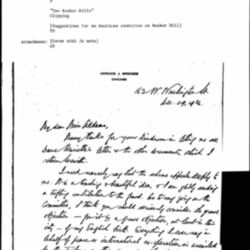Reprinted from THE DAILY TELEGRAPH, Saturday, August 7th, 1926.
ENGLAND'S BUNKER HILL.
From DAME HENRIETTA BARNETT.
TO THE EDITOR OF "THE DAILY TELEGRAPH."
SIR -- While we are giving welcome to so many American visitors, and striving, in a feeble way, to return some of the abundant hospitality which has been showered on those of us who have been so fortunate as to visit their great country, it may be a fitting time to mention the English Bunker Hill. To most people it will be an astonishment that there is one, but indeed there are two in England -- one in Lincolnshire and one close to London, abutting on to Hampstead Heath.
At present the hill is up for sale. The owners, being, not unnaturally, eager to take advantage of the insistent demand for houses, are ready to receive the builders' application to cut it up in plots, and give only to the residents the glorious view that is to be seen from the slopes and summit of the anciently-named hill. But in response to my earnest desire to use the English Bunker Hill as a hill of reconciliation, a few months' grace has been granted in the hope that some of our visitors from the United States will care to give money to commemorate the English men, as we Britons have cared to give money to commemorate the American men, who, united by the cause of Liberty, fell fighting side by side.
The hill, from which undoubtedly the one in Massachusetts took its names, is only divided by the road from Hampstead Heath, to which thousands and hundreds of thousands of people from London come for pleasure £15,000 that is needed can be met it is proposed to inscribe on tablets on a low wall the names of the regiments and the commanding officers of the American and English armies who allied to conquer. In front of the wall might be a light railing, and beds of growing flowers, to be kept ever fresh and bright. A short distance from the wall could be placed a metal table, with the names of the battlefields and countries where the regiments fought together, and by the side of the names there would be arrows pointing in the direction of the places. Thus parents who have lost their dear ones could stand by the table and see, by the arrows pointing to France, Flanders, Syria, Serbia, Italy, where those they loved have died. On the slope of the hill a large stone globe might stand, on which would be carved the names of the American States and chief towns, so that the English people could learn more of the great country which sent its men to aid the Allies, and say to each other, "Look here, this is Boston, Charlestown, or New York, where that fine fellow I told you of came from, and now he lies out yon," and then they can turn to the metal table and see where to look for "out yon."
But as war, even victorious and righteous war, is ever a sad subject, it might be deemed desirable to direct thoughts to nature and its beauties. Thus, written on stone slabs, people could read what trees and flowers are to be seen on the hillside and in the [neighboring] woods and fields; when the tides rise and fall; what stars may be seen, and where to look for them in different seasons; and, perhaps, too, the geological formation of the [neighborhood] could be indicated. In this way, without didactic words, thoughts might be lifted beyond bitter conflicts toward Nature and Nature's God. Great thoughts have been put by the great men of both nations, and, on tablets, might be engraved words from Shakespeare, Washington, Emerson, Lincoln, John Bright, Browning, or other writers. If this was done on Bunker Hill we should have wisely copied America in engraving great words on her public buildings, and those who sit in peace and read would feel their hearts stirred anew with sympathy toward the American people, who joined with Great Britain to give their lives for the cause of right.
It is my privilege to have countless friends in the United States, who will, I know, want to enable this idea (merely thrown out sketchily here) to be [materialized], and there are many to whom such a memorial will appeal. From them all I should be glad to hear at 1, South-square, Hampstead Garden Suburb, from them to gather fresh suggestions and to take them to see the beautiful hill, so soon to be lost [forever] unless we can combine to act quickly. -- Yours, [etc.],
HENRIETTA BARNETT.
Hampstead Garden Suburb.













Comments